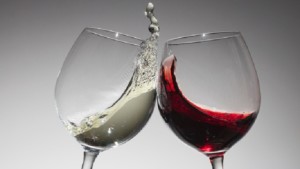Rumor has it that you should drink a glass of wine before you go to bed. But is this just a myth? From what I heard, drinking an alcoholic beverage such as wine in small amount before you go to bed works to decrease stress in your body, helping your overall health. But why would wine help stress and due all wines have the same effect? All of this interests me as I hear the rumors and try to process the truth for the myths.
Doctors agree that there is definitely something in red wine that helps your health. For example, red wine has health benefits for your heart. Red wine contains antioxidants known as polyphenols. Polyphenols may help protect the lining of blood vessels in your heart. Resveratrol is one type of polyphenol that is in red wine. It is thought to help prevent damage to blood vessels, reduce low-density lipoprotein cholesterol (the “bad” cholesterol) and prevents blood  clots. Unfortunately all this information is based on research done on animals, not people. This suggests that there is a possibility that resveratrol doesn’t effect humans the same way as they believe. With this in mind, no doctor would tell their patients with heart problems to increase their consumption of wine, especially because it is an alcoholic beverage.
clots. Unfortunately all this information is based on research done on animals, not people. This suggests that there is a possibility that resveratrol doesn’t effect humans the same way as they believe. With this in mind, no doctor would tell their patients with heart problems to increase their consumption of wine, especially because it is an alcoholic beverage.
Other studies have shown that moderate consumption of wine has positive effects on the stress and cardiovascular health of the consumers. This is mainly due to the vasodilatory properties of wine. Wine, like all other alcohol, is a vasodilator, meaning it causes blood vessels to relax and widen. But, it is important to keep in mind the word moderate, because at high levels, it becomes a vasoconstrictor, shrinking the vessels and increasing blood pressure.
To show that red wine, specifically, causes the distressing due to it’s vasodilatory  properties, Markus Flesch, Andreas Schwarz, and Michael Böhm, did an observational study comparing white and red wine. To complete the study they used dozens of different red and white wines to create a large sample group. They then obtained human coronary arteries that were transplanted from patients suffering from end-stage heart failure. To decide the effect the wine had on the arteries they measured the contraction and relaxation of them while in an organ bath containing the wine based solutions. The result was that the vasodilatory effects of white wines were much less pronounced than the vasodilatory effects of red wines.
properties, Markus Flesch, Andreas Schwarz, and Michael Böhm, did an observational study comparing white and red wine. To complete the study they used dozens of different red and white wines to create a large sample group. They then obtained human coronary arteries that were transplanted from patients suffering from end-stage heart failure. To decide the effect the wine had on the arteries they measured the contraction and relaxation of them while in an organ bath containing the wine based solutions. The result was that the vasodilatory effects of white wines were much less pronounced than the vasodilatory effects of red wines.
Overall, drinking wine to increase health only works when you do so in moderation. No one with major heart problems should ignore there doctor’s recommendation to eat certain foods and take a certain medications to drink red wine instead. It just doesn’t work that way. But definitely, after a stressful at work as an adult, you can relax your mind and body with a glass of wine. But remember one serving of wine is five ounces, so using one of those 30 ounce wine glasses doesn’t work when drinking in “moderation”.
glass of wine. But remember one serving of wine is five ounces, so using one of those 30 ounce wine glasses doesn’t work when drinking in “moderation”.

This is an interesting article because I have heard on multiple occasions how wine can be healthy or good for you on a daily basis. It is intriguing that there have been minimal studies on humans measuring the health benefits. Rather than saying how wine is good for you, I think the supported phrase should be how in moderation, wine isn’t bad to drink. Moderation is the key word there. Many things are good for you in moderation, but can also be devastating with overconsumption/overuse (other alcohol, food, technology, etc). I really enjoyed that picture with the “Six Health Benefits of Wine” and think that it could be a good place to look for more blog topic ideas in this same subject. Now I’m thinking about blogging and researching whether wine prevents dementia!